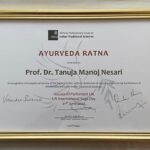Ayurveda industry set to enter cardiac department with scientific evidence. Pranayama, sasneha virechana , vrana upkrama and set of asanas plays preventive role of many diseases. Langhan is helpful in chronic heart failure and obesity management. Industry scouts for scientific evidence-based Ayurveda to combat cardiac illness.
National, May 22022: In a bid to promote scientific evidence-based Ayurveda across the country, a four-day National Ayurved Cardiology Symposium – first of its kind in India, was held to present and share various case studies supported with clinical data about Ayurveda’s success in treating and reversing cardiac diseases. Madhavbaug, brand of Vaidya Sane Ayurved Laboratories Ltd, a specialist in treating and reversing cardiac related ailments through their Ayurvedic treatment and therapies brought together about 5,000 doctors from across India for this virtual conference, which saw even wide participation from the practitioners of modern medicines.
The Symposium was powered by Medemy.in and MIPC chair of Maharashtra University of Health Sciences was the knowledge partner. Addressing the participants, Dr Rohit Madhav Sane, MD & CEO of Madhavbaug underscored the need for scientific evidence based practice of Ayurveda to unleash its real potential. “A major concern about Ayurveda is the lack of evidence based approach in its treatment procedure. Any treatment method to stand the test of time should be scientifically proven. We have taken a major initiative in that direction by developing a standard treatment protocol for over 100 disorders based on clinically validated data,” Dr Sane added.
In her inaugural speech, Dr Madhuri Kanitkar, Lt. Gen (Retd), Vice Chancellor of Maharashtra University of Health Sciences (MUHA) made a strong pitch for the proper documentation of Ayurveda’s success in treating various illnesses.
Echoing a similar thought, Dr Jagdish Hiremath, Chair Professor of Madhavbaug Institute of Preventive Cardiology chair by Maharashtra University of Health Sciences, said proper scientific record of various Ayurvedic treatment therapies and drugs will help the industry to make a major mark at the global level.


1510 Ayurveda Doctors participated on virtual platform of ZOOM, FB, LinkedIn etc, The four day virtual event witnessed around 82 ayurvedic cardiac specialists from Maharashtra, Gujrat, MP, UP, Karnataka, Goa presenting their extra-ordinary and challenging case studies supported by clinical data about ayurvedic management of various cardio metabolic disorders. Some of the major case studies presented during the symposium include role of Pranayama in Chronic stable angina, role of sasneha virechana in hypertension, role of vrana upkrama in diabetic wound management, role of set of asanas in primary prevention of CHF, effect of Langhan in fluid retention in known case chronic heart failure, obesity management in patients with comorbidities and role of 800 cal low carbohydrate diet and herbal medicines in diabetes patients among others.
Dr Omkar Chaudhari, Dr Aman Kapoor, Dr Nilesh Kulthe, Dr Saadik Khan, Dr Ranjit Narang and Dr Pravin with Team of technical support Organised the complete Event.
The event assumes significance in the backdrop of sharp increase in deaths due to cardiovascular ailments, witnessed even in younger population. According to various industry reports, incidence of death due to cardio vascular disease has increased by 32 per cent in last 25 years. Interestingly, cardio related ailments remained a prime cause of hospitalisation, often a major drain on families saving and premature deaths in India. With modern medicine unable to reduce high incidence of deaths on account of cardiac illness, evidence-based success stories from Scientific Ayurveda – spearheaded by Madhavbaug is expected to make cardiac treatment affordable and accessible to many individuals across India.
Madhavbaug, has published over 150 research reports in peer reviewed allopathic medical journals – nationally and globally highlighting its success in treating and reversing lifestyle disorders like diabetes, cardio-vascular disease, hypertension and obesity.













